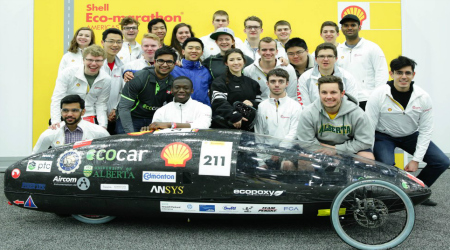
FAST TIMES: The Eco Car student club 2017 counted successes in this year's Detroit competition.
(EDMONTON) The University of Alberta EcoCar team's zero-emissions vehicle, named Sofie, came in second in the prototype category at the 11th annual Shell Eco-marathon Americas competition in Detroit, Mich., April 27-30.
"The first time we entered the prototype category, we got second place," said Jason R. Wang, a fourth-year co-op student in mechanical engineering and manager of the EcoCar project.
Fresh out of the shop, Sofie debuted on the eco racetrack only a few weeks after the team had unveiled the concept, and the vehicle has already secured a spot in the major league.
"On our first two attempts ever, Sofie was able to complete the 9.7 kilometres we needed to do. She was flawless, everything worked. I don't think our team has ever been so successful," added Wang. Normally it takes a few tries-and some modifications-for a vehicle to warm up to the track conditions before it can cover the required distance.
"The fact that Sofie performed exactly like we had anticipated means more than the ranking we got," said Wang.
To measure success, the Shell Eco-marathon challenges the car's efficiency, its ability to go the furthest using the least amount of energy. Sofie's efficiency was 155 km/m3 hydrogen, making the vehicle only 23 km/m3 hydrogen less efficient than the winner in this category.
Sofie's score on the leaderboard and improved reliability speak volumes about the team's ability to build on previous years' shortcomings. Not only is Sofie reliable, but also one of the lightest vehicles in her division-another accomplishment for the EcoCar team testing the new waters.
"We had designed Sofie to weigh 60 kilograms. When we measured her, she was 60.5 kilograms. This is incredible because other cars that have been racing for years are heavier," said Wang.
Unlike Sofie's stellar performance at the competition, the team's Urban Concept racer, Alice, who made it to the world championships in London, England, last year, had a bumpier ride.
"We had a major electrical issue on Alice that we tried really hard to solve," said Wang. The fuel cell system on Alice wasn't booting up properly, preventing the car from reaching its full operating potential.
After diagnostic tests, the team still wasn't able to pinpoint the root problem. "We had a tough call to make," Wang said. "We tried to use some of Sophie's electrical components to help fix Alice."
Although both vehicles have similar electrical parts, the host, Alice, didn't quite accept the transplant, and damaged components borrowed from Sofie.
After the team patched Sofie up for her next attempts on the track, she was showing a better time, but couldn't complete in the race due to a recurring issue that triggered the vehicle's safety system alert.
"The safety board wouldn't let us finish the race. We had to treat it as an actual safety concern," Wang said.
Despite Alice's failure to pass the technical inspection and the damage to Sofie's electrical components, multiple troubleshooting attempts in a stressful situation brought the team together.
"This experience showed our maturity and how well we work together," Wang said. "Our goal was to set a high benchmark, and we did it. Now we're going to keep improving." After four days in Detroit, team members plan to catch up on sleep and start afresh.
"We've grown so much as a team," Wang added. "Where we are now is far from where we started a year ago, and it inspires me so much."